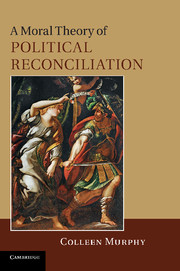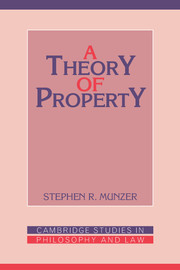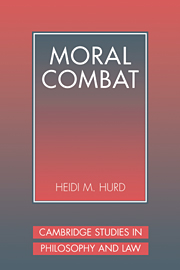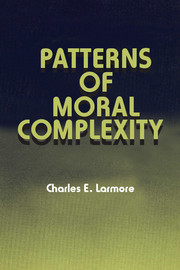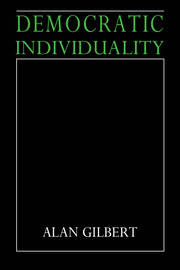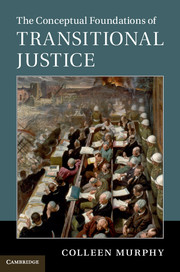A Moral Theory of Political Reconciliation
Following extended periods of conflict or repression, political reconciliation is indispensable to the establishment or restoration of democratic relationships and critical to the pursuit of peacemaking globally. In this important new book, Colleen Murphy offers an innovative analysis of the moral problems plaguing political relationships under the strain of civil conflict and repression. Focusing on the unique moral damage that attends the deterioration of political relationships, Murphy identifies the precise kinds of repair and transformation that processes of political reconciliation ought to promote. Building on this analysis, she proposes a normative model of political relationships. A Moral Theory of Political Reconciliation delivers an original account of the failure and restoration of political relationships, which will be of interest to philosophers, social scientists, legal scholars, policy analysts, and all those who are interested in transitional justice, global politics, and democracy.
- Offers a comprehensive account of the process of political reconciliation and looks at how best to judge success in public policies
- Provides resources for resolving the moral dilemmas of transitional justice
- Gives an insight into the moral failings and moral harms plaguing political relationships that occur during civil conflict and repressive rule
Reviews & endorsements
"....Murphy's Moral Theory is a nice addition to the literature.... Murphy presents an unapologetically ideal account of political community -- one which both expresses respect for and supports certain capacities of its citizens -- and the goal of political reconciliation is to bring this about...."
--Kendy M. Hess, College of the Holy Cross, Notre Dame Philosophical Reviews
"....Murphy’s book offers a great deal to readers interested in the political philosophy of reconciliation. The discussions of the rule of law, political trust, and the general framework for reconciliation in particular are rich and insightful. Moreover, the book helps to fill an unfortunate gap in the literature on reconciliation by offering an extended systematic political philosophical account of reconciliation that is analytically sharp and morally insightful. It thereby helps us to understand better the moral issues in political reconciliation, and, I expect, will help to repair the shameful dearth of philosophical attention given to these matters by encouraging other political philosophers to think carefully about them."
--Darrel Moellendorf, Philosophy Department, San Diego State University, Ethics: An International Journal of Social, Political, and Legal Philosophy
"....This is a well-argued analysis of some of the damage that civil conflicts and repressive governments do to political relationships, especially in postauthoritarian transitional societies...."
--Stephen L. Esquith, Michigan State University, Perspectives on Politics
"Colleen Murphy provides us with an original, nuanced, well-written and analytically incisive diagnosis of how political relationships fail and what it takes to fix them. This is an important and timely book furthering both our understanding of what counts, normatively, as a healthy polity and what can be done practically to nurse war-torn communities back to health.... The book is a display of analytic political philosophy at its best, seamlessly blending the normative and practical aspects of post war repair. It is sure to become a central text in the growing literature in this field."
--Nir Eisikovits, Suffolk University, Human Rights Quarterly
"...A Moral Theory of Political Reconciliation offers theorists and practitioners of reconciliation a wealth of thoughtful insights and useful theoretical tools for navigating the murky waters of post-conflict repair. It also invites us to rethink the nature of political relationships more generally, both as they ought to be and as they fall away from this ideal. Finally, Murphy’s desiderata for a theory of political reconciliation and her own answers to those desiderata raise the bar for future philosophical interventions. For all these reasons, her book is a welcome addition to ongoing discussions of political transitions."
--Alice MacLachlan, Transnational Legal Theory
"...the book balances sophisticated philosophical reasoning with concrete guidelines for existing political orders.... the book balances a stress on the political character of the ethic with a concern for the moral attitudes and beliefs of citizens.... Murphy achieves a nice balance between parsimony and complexity..."
--Daniel Philpott, University of Notre Dame, Journal of Moral Philosophy
Product details
November 2012Paperback
9781107411722
224 pages
229 × 152 × 12 mm
0.3kg
Available
Table of Contents
- Acknowledgements
- Introduction
- Part I. Conceptual Frameworks:
- 1. The rule of law
- 2. Political trust
- 3. Capabilities
- Part II. Promoting Political Reconciliation:
- 4. Evaluating processes of political reconciliation
- 5. Truth commissions
- 6. International criminal trials
- Conclusion
- Bibliography.

